This is the main site for a 3-year project funded by the UK Arts and Humanities Research Council (AHRC) on Understanding Biological Disarmament. Professor Brian Balmer is the STS project lead.
Understanding Biological Disarmament: The Historical Context of the Origins of the Biological Weapons Convention.
This is the main web-site for a 3 year project funded by the UK Arts and Humanities Research Council (AHRC) on the history of Biological Weapons Convention. The project commenced on 1st September 2013 and ran for three years. The project was then granted an extension until July 2017.
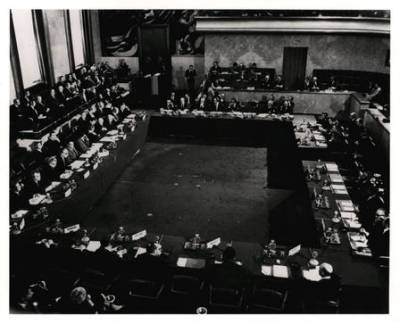
The Conference on the Committee on Disarmament at work at the Palais des Nations at Geneva (1969). The Lederberg Archive, Courtesy of the US National Library of Medicine.
About the AHRC History of the BWC Project
Outlawing an entire class of weapons is a major step towards creating a safer world. Just over forty years ago, on 10 April 1972, the first ever such step was taken as the nations of the world were invited to sign up to the new Biological Weapons Convention (BWC). This treaty, which had been several years in the making, sought to ban biological weapons, or more colloquially germ warfare. As such, it was remarkable for attempting not simply biological arms limitation but full disarmament. Three years later the treaty entered into force, in other words its provisions now had full legal effect. Currently, and despite all kinds of set-backs, 170 nations are states parties to the BWC (April 2013).
Despite its significance, and close to the fortieth anniversary of its entry into force, there is surprisingly little scholarly research on the origins of the BWC, still less on how this treaty was shaped by its broader political and social context. Perhaps more remarkably, most scholarship on the Cold War ignores the BWC. Understanding Biological Disarmament is a new three-year project, funded by the AHRC, which aims to draw on a wide range of archival and oral sources to go beyond a blow-by-blow account of the technicalities of arms treaty negotiation, and instead provide a deep historical account of the birth of the treaty.
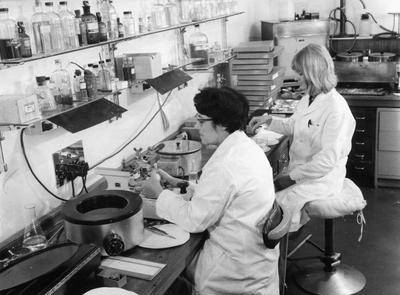
Porton Down laboratory staff carry out histological work in the Experimental Pathology Section of the Microbiological Research Establishment in the late
© Crown copyright. IWM (HU 102378) (Courtesy IWM Non-Commercial License).
The historical roots of the BWC are intimately bound up with the Cold War and other wider concerns, particularly: Anglo-American relationships; nuclear and chemical weapons policy; varying attitudes to US chemical agent use in Vietnam; the different obligations and interpretations of the 1925 Geneva Protocol; and the complex roles of experts, both scientific and social scientific, individual and collective, civil and military, in shaping events.
In this respect:
- Existing accounts give an adequate overview, but there remain crucial gaps in description and analysis. We have but a scant account of the foundations of discussion about the BWC, the negotiation period, or the period until the BWC's 1975 entry into force.
- Many potentially important direct and indirect influences on the BWC have not been explored. For example, the negotiators of the Nuclear Non-Proliferation Treaty were the same as for the BWC; the full influence on treaty negotiations of uses of tear gas in Vietnam and poison gas in Yemen 1967 remains unexplored.
- Existing accounts of the BWC are only suggestive about: the influence of non-governmental groups such as Pugwash and the Bernal Peace Library; the thinking of individuals such as Hedley Bull, the international relations scholar, turned director of the Arms Control Disarmament Research Unit of the Foreign Office; and the actions of scientist-advisers such as Sir Solly Zuckermann.
By addressing the gaps and research problems outlined above, we suggest that a more thorough historical account based primarily on UK and US sources will contribute far more than added layers of description to existing analysis. In short, our study will seek to write the BWC into the historiography of the Cold War and, in particular, the period of détente.
The research will be of value to academic historians, political scientists, science and technology studies scholars, and sociologists. Through a series of public events, we intend to demonstrate how this research will be relevant to users outside the academic community, particularly those concerned with the development of effective policy approaches to the threat posed by biological weapons. Such concerned groups include: civil servants, the security community, policy-makers, NGO workers and campaigners.
Read a shortened version of the full project proposal:
People involved in the Project
This is the research team involved in the AHRC History of the Biological Weapons Convention project:
- Prof. Brian Balmer in the UCL Department of Science and Technology Studies (STS) is the Principal Investigator.
- Dr Caitriona McLeish at the Harvard-Sussex Program (HSP), SPRU - Science and Technology Policy Research Unit is the Co-Investigator.
- Dr Alex Spelling in the UCL Department of Science and Technology Studies (STS) is the postdoctoral Research Associate on the project.
Project Advisory Board
- Dr Patricia Lewis (Chatham House)
- Professor Julian Perry-Robinson (Sussex University)
- Professor Ulf Schmidt (Kent University)
- Mr Nicholas Sims (LSE)
- Dr Stephen Twigge (National Archives)
- Dr John Walker (Arms Control and Disarmament Research Unit, Foreign and Commonwealth Office)
- Events
Talks
Brian Balmer, 'Are Boundaries the Best Way to Think About the Relationship Between Politics and Science?: A Case Study from the History of Tear Gas', presented at the Workshop 'Science Policy: Research at the Boundary', University of LaLaguna, La Laguna, Tenerife, Spain, 21 October 2016.
Brian Balmer, Alex Spelling and Caitriona McLeish, 'Tear Gas Epistemology', presented at the Workshop on 'Science/Technology/Security: Challenges to Global Governance', University College London, 20-21st June 2016; and at 4S/EASST Conference on 'Science and Technology by Other Means: Exploring Collectives, Spaces and Futures', Barcelona, Spain, 31 Aug-3 Sep 2016.
Eighth Review Conference of the BWC
On 9 November 2016 the project team attended the Eighth Review Conference of the BWC at the UN Palais de Nations, Geneva. The five-yearly Review Conferences last three weeks and are the most significant events in the Biological Weapons Convention calendar and are attended by many of the 177 States Parties to the Convention as well as interested civil society organisations from across the world. The team gave talks at a lunch time side event organised jointly to showcase the AHRC project on the History of the Biological Weapons Convention and to launch a new edited collection Biological Threats in the Twenty-First Century (in which two chapters are the result of research from the AHRC project). The event was attended by c.40 people and was organised by the editor of Biological Threats in the Twenty-First Century, Dr Filipa Lentzos from Kings College London.
Preparatory Conference for the Eighth Review Conference of the BWC
On August 11th 2016, Drs James Revill and Caitriona McLeish presented a briefing paper on the topic of Article X of the Biological Weapons Convention (BWC) at a side-event during the Preparatory Committee for the Eighth Review Conference in Geneva. This article of the convention, which deals with international cooperation, has become increasingly divisive, and the presenters outlined the origins and evolution of such division before identifying concrete proposals for States Parties to consider at the BWC Review Conference in November of this year.
This side event in Geneva, which drew some 50 participants from governments and civil society, stimulated a lively discussion with the involvement of representatives of several states including: France, Georgia, Germany, India, Japan, the Russian Federation, the UK and the US. The event drew on elements of a joint project on Understanding Biological Disarmament between Professor Brian Balmer of UCL Science & Technology Studies Department and Caitriona Mcleish of SPRU and was funded, in part, by the UK Arts and Humanities Research Council (AHRC).
Workshop on History, Security and Arms Control
To mark the conclusion in September of the project's AHRC funded phase, on June 22, 2016, we held a workshop on 'History, Security and Arms Control' in the Haldane Room at UCL. The event was attended by over 50 invitees and speakers drawn from academia, government, NGO, and civil society. The aim was to explore the role that history has had, or could have, for arms control and security. Themes and questions addressed included:
What constructive and practical conclusions can be drawn from historical studies of security and arms control for policy-makers and practitioners?
What are the limits of the utility of history?
What is the relationship between researchers and the non-academic community?
How do the products and practice of historical research differ when historians are ‘embedded’ in the organisations they are researching?
Speakers:
- Dr. Anna Feigenbaum, Bournemouth University.
- Professor Michael Goodman, Kings College London.
- Professor Jeanne Guillemin, MIT.
- Professor Jacob Hamblin, Oregon State University.
- Professor Sonia Ben Ouagrham-Gormley, George Mason University.
- Professor Brian Rappert, University of Exeter.
- Professor John Simpson OBE, Southampton University.
- Mr Nicholas Sims, LSE.
- Professor Kathleen Vogel, North Carolina State University.
- Dr John Walker, ACRDU, Foreign and Commonwealth Office.
90th anniversary of the Geneva Protocol
The 2015 Meeting of States Parties of the Biological Weapons Convention took place in in Geneva from 14 to 18 December 2015. As a side event, on December 15, 2015, the United Nations Institute for Disarmament Research (UNIDIR) held an event to mark the 90th anniversary of the signing of the Geneva Protocol and its linkage to the Biological Weapons Convention. Dr Caitriona McLeish gave a presentation entitled The Geneva Protocol and the BWC: Some Notes from History to the gathered diplomats. You can hear the full talk and see the presentation slides by clicking the link in the paragraph.
40th anniversary of the BWC
The Biological Weapons Convention entered into force on March 26, 1975. On March 30, 2015, a commemorative event will be held in the Council Chamber in the Palais des Nations in Geneva, the same room where the Committee of the Conference on Disarmament negotiated the BWC from 1969 to 1971.
The project team will be present at the ceremony and Dr Caitriona McLeish will give a presentation entitled: 'The 40th anniversary of the BWC - remembering the origins of the Convention'. The anniversary site can be found here.
A selection of pictures from the event are available here.
The BWC's roots in the Geneva Protocol were mentioned in an NGO (University of London) statement co-authored by Filippa Lentzos, Nicholas Sims and Brian Balmer. The statement was made to the BWC Meeting of Experts, Palais de Nations, Geneva, 10-14 August 2015.
Witness Seminar
As part of the AHRC project on the historical context of the origins of the Biological Weapons Convention (BWC), we held a ‘witness seminar’ at the University of Sussex on 10th October 2014. At the seminar our panel of witnesses discussed their recollections of the mid-1960s and 1970s when the BWC was negotiated, signed and came into force. The panel members were Professor Jeanne Guillemin, Professor Matthew Meselson, Professor Julian Perry-Robinson and Mr Nicholas Sims. In front of a small audience, which included both academics and non-academics interested in the topic, they discussed their own involvement in the BWC, as well as the wider context of non-governmental organisations, activists, scientists, the Vietnam War and the rise of the counter-culture. The event was held under Chatham House Rule but was recorded and we intend to publish an edited version of the transcript.
- Project publications
Final Report
Discussion Articles
James Revill, Caitriona McLeish, Alex Spelling, Brian Balmer (2016) Options for International Cooperation Under Article X of the Biological and Toxin Weapons Convention, Trust and Verify (VERTIC) No.154 pp.1-5.
Briefing Notes
Alex Spelling, Caitriona McLeish, Brian Balmer (2014)
.James Revill, Caitriona McLeish, Alex Spelling, Brian Balmer (2016), Options for Article X
Online media
Edited collections
Jean Guillemin, Matthew Meselson, Julian Perry Robinson and Nicholas Sims, Witness Seminar: Origins of the Biological Weapons Convention in in Filippa Lentzos ed., 'Biological Threats in the 21st Century', (Imperial College Press, 2016). .
Marie Chevrier and Alex Spelling, The traditional tools of biological arms control and disarmament, in Filippa Lentzos ed., 'Biological Threats in the 21st Century', (Imperial College Press, 2016).
Journal articles
Brian Balmer, Caitriona McLeish and Alex Spelling, Preventing 'A Virological Hiroshima': Cold War Press Coverage of Biological Disarmament, Journal of War and Culture Studies, 2016 9(1): 74-90, (Gold Open Access).
Alex Spelling, '"Driven to tears": Britain, CS Tear Gas and the Geneva Protocol, 1969-75', Diplomacy and Statecraft, 27/4, 2016, (Gold Open Access).
- Suggested Readings
Jeanne Guillemin, Biological Weapons, From the Invention of State-Sponsored Programs to Contemporary Bioterrorism, New York 2005.
Gregory Koblentz, Living Weapons – Biological Warfare and International Security, New York 2009.
Jonathan Tucker, ‘A Farewell to Germs: The US Renunciation of Biological and Toxin Warfare, 1969-70’, International Security, Vol 27, No 1, 2002, pp. 107-148.
John Walker, Britain and Disarmament – The UK and Nuclear, Biological and Chemical Weapons Arms Control and Programmes 1956-75, Surrey 2012.
Mark Wheelis, Laips Rozsa and Malcom Dando(eds), Deadly Cultures, Biological Weapons Since 1945, London 2006.
Nicholas Sims, The Diplomacy of Biological Disarmament: Vicissitudes of a Treaty in Force, 1975-85, New York 1988.
Susan Wright (ed), Biological Warfare and Disarmament, New Problems / New Perspectives, Oxford 2002.
- Preventing a Biological Arms Race, London 1990.
Stockholm International Peace Research Institute (SIPRI), The Problem of Chemical and Biological Warfare, SIPRI 1971 and 1975.
- Online resources and links
- United Nations Office for Disarmament Affairs (UNODA)
- United Nations Office at Geneva (UNOG)
- US Department of State
- The Australia Group
- The Biological and Toxin Weapons Convention site - hosted by the Department of Peace Studies, University of Bradford
- Stockholm International Peace Research Institute (SIPRI)
- Pugwash
- The Harvard Sussex Program (HSP)
- Images
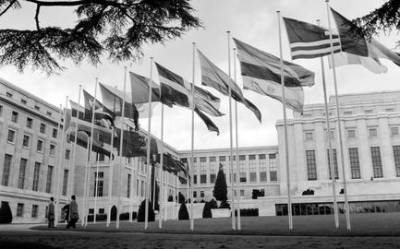
Palais Des Nations, Geneva, 1960. UN Photo - courtesy of the UN.
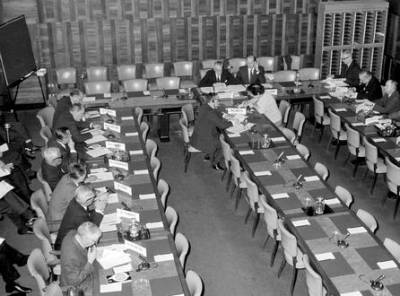
Experts meeting for UN Chemical and Biological Warfare (CBW) study, Geneva, Jan 20, 1969. UN Photo - courtesy of the UN.
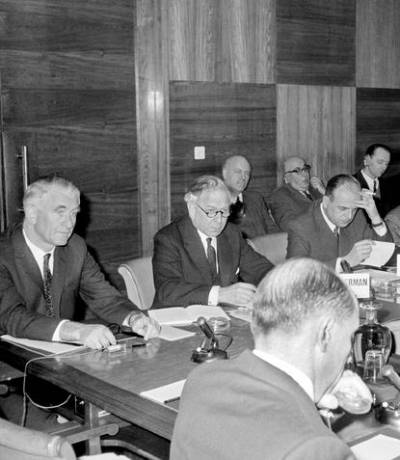
Experts meeting for UN CBW study part 2, Geneva, Jan 20, 1969. UN Photo - courtesy of the UN.
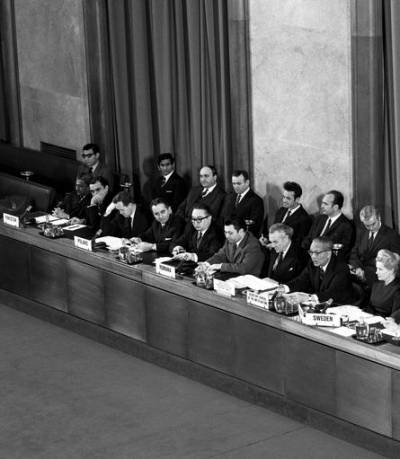
Conference of the Committee of Disarmament (CCD) listen to the Secretary General's statement, Feb 18, 1970. UN Photo - courtesy of the UN.
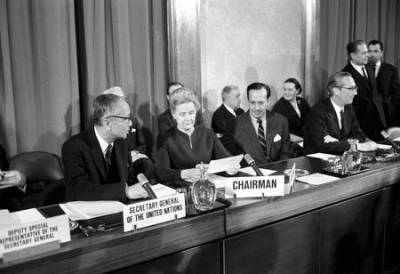
Alva Myrdal, Swedish Ambassador to the CCD, Feb 18, 1970. UN Photo - courtesy of the UN.
 Close
Close

